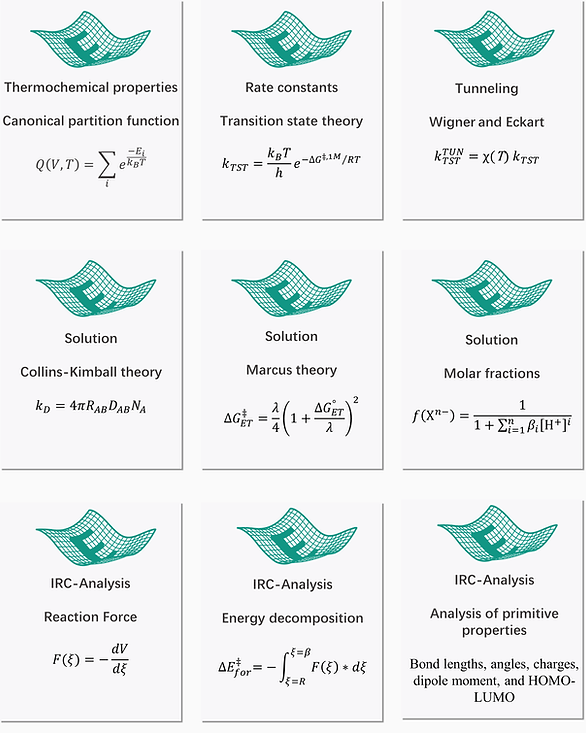Eyringpy

User-friendly program
Eyringpy is a program designed to compute rate constants using Transition State Theory (TST) and Variational Transition State Theory (VTST), both in the gas phase and in solution. The Gibbs activation energy is obtained from canonical partition functions calculated from first principles. The program supports unimolecular and bimolecular reactions with one or two products. It can also estimate the rate constants of bimolecular reactions involving pre-reactive and/or product complexes. Reaction symmetry is included, and one-dimensional Wigner and Eckart tunneling corrections are available.
For solution-phase reactions, Eyringpy incorporates Collins–Kimball theory to account for diffusion limits, Marcus theory for electron transfer (ET) processes, and molar fractions to evaluate pH effects in aqueous media.
The latest version, Eyringpy, includes an IRC-Analysis module that monitors the evolution of primitive changes along the intrinsic reaction coordinate (IRC). Currently available analyses include bond distances, bond angles, Wiberg bond indices, natural charges, dipole moments, orbital energies and related properties, as well as reaction forces.
To improve accuracy, energy profiles are smoothed using a spline interpolator from Python’s SciPy library, while a discriminator removes noisy data points. Visualization of the evolution of primitive changes is performed with Python’s Matplotlib library.

Compatibility
Eyringpy is compatible with Gaussian output files. Since version 2.1, compatibility has been extended to ORCA output files as well. Eyringpy 3.0 is available for Windows, macOS, and Linux:
-
Windows (64-bit): Windows 10 or 11
-
MacOS: OS X 10.11 (El Capitan) or later
-
Linux (64-bit): Distributions based on Ubuntu 22.04 LTS or newer (requires glibc 2.7 or higher)
Download Eyringpy 3.0
To obtain a copy, please complete the registration form. You will then receive access to the binary files compatible with your operating system.
[Download Eyringpy 3.0]
Old versions
Eyringpy 2.1
-
Windows (64-bit version): Windows 10 y 11
-
MacOS: OS X 10.14 (Mojave) and later
[Download Eyringpy 2.1]
Eyringpy 2.0
Available for the 64 bits version of:
-
Windows (64-bit): Windows 10 y 11
-
MacOS: OS X 10.11 (El Capitan) and later
-
Linux (64-bit): Ubuntu 18.04 and later
[Download Eyringpy 2.0]
Citation
If you use Eyringpy in your research, please cite the following references as appropriate:
For VTST rate constants and Hindered Rotor Model
1. E. Dzib, A. Quintal and G. Merino, Enhancing Eyringpy: Accurate Rate Constants with Canonical Variational Transition State Theory and the Hindered Rotor Model. J. Chem. Theory Comput. 2024, 20, 9999–10009.
2. E. Dzib, J. L Cabellos, F. Ortíz-Chi, S. Pan, A. Galano and G. Merino, Eyringpy: A Program for computing Rate Constants in the Gas Phase and in Solution. Int. J. Quantum Chem. 2019, 119, e.256
For IRC and Reaction Force Analysis
3. A. Quintal, E. Dzib, F. Ortiz-Chi, P. Jaque, A. Restrepo and G. Merino, Automating the IRC Analysis within Eyringpy. Int. J. Quantum Chem. 2021, e26684.
General reference
4. E. Dzib, A. Quintal, F. Ortiz-Chi and G. Merino, Eyringpy 3.0, Cinvestav, Mérida, Yucatán, 2025.
Contact
For more information, bug reports, or suggestions for improving Eyringpy, please contact us at eyringpy2018@gmail.com.
When reporting issues, describe the problem in detail and attach the relevant output files (*.out or .log) along with the input file (.eif) used.
Papers citing Eyringpy
1. Gómez, S.; Restrepo, A. Phys. Chem. Chem. Phys. 2019, 21, 15815.
2. Llano, S.; Gómez, S.; Londoño, J.; Restrepo, A. Phys. Chem. Chem. Phys. 2019, 21, 3752.
5. Ngo, T. C.; Nguyen, T. H.; Dao, D. Q. J. Chem. Inf. Model. 2019, 59, 766.
6. Thong, N. M.; Vo, Q. V.; Huyen, T. L.; Bay, M. V.; Tuan, D.; Nam, P. C. ACS omega 2019, 4, 14996.
7. Van Quan, V.; Phu, H. T.; Thao, P. T. T.; Nam, P. C. Vietnam J. Chem. 2019, 57, 728.
9. Vo, Q. V.; Mechler, A. J. Chem. Inf. Model. 2019, 60, 316.
12. Vo, Q. V.; Van Bay, M.; Nam, P. C.; Mechler, A. J. Phys. Chem. B 2019, 123, 7777.
13. Vo, Q. V.; Van Bay, M.; Nam, P. C.; Mechler, A. ACS omega 2019, 4, 19375.
14. Vo, Q. V.; Van Gon, T.; Van Bay, M.; Mechler, A. J. Phys. Chem. B 2019, 123, 10672.
15. Wei, W.; Ma, J.; Xie, D.; Zhou, Y. RSC Adv. 2019, 9, 13776.
16. Amić, A.; Milenković, D.; Marković, J. D.; Marković, Z. J. Serb. Soc. Comput. Mech. 2020, 45.
17. Arrué, L.; Pino‐Rios, R. J. Comput. Chem. 2020, 120.
20. Boulebd, H.; Mechler, A.; Hoa, N. T.; Vo, Q. V. New J. Chem. 2020, 44, 9863.
21. Boulebd, H.; Tam, N. M.; Mechler, A.; Vo, Q. V. New J. Chem. 2020, 44, 16577.
23. Djefoulna, V. H. H.; Fifen, J. J.; Malloum, A.; Jaidane, N.-E. Theor. Chem. Acc. 2020, 139, 1.
24. Hoa, N. T.; Van Bay, M.; Mechler, A.; Vo, Q. V. ACS omega 2020, 5, 17715.
25. Huong, D. Q.; Duong, T.; Nam, P. C. Hue Univ. J. Nat. Sci. 2020, 129, 5.
26. Minh, T. N. Vietnam J. Sci. Technol. 2020, 58, 565.
29. Vo, Q. V.; Hoa, N. T. RSC Adv. 2020, 10, 36843.
30. Vo, Q. V.; Hoa, N. T.; Nam, P. C.; Quang, D. T.; Mechler, A. ACS omega 2020, 5, 24106.
31. Vo, Q. V.; Tam, N. M.; Van Bay, M.; Mechler, A. Chem. Phys. Lett. 2020, 739, 137004.
35. Boulebd, H., Phytochemistry 2021, 184, 112670.
38. Vo, Q. V.; Hoa, N. T.; Mechler, A., Polym. Degrad. Stab. 2021, 185, 109483
%2013_50_06.png)